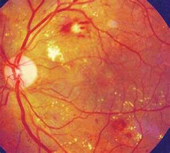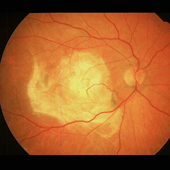Our Services
Medical Retinal Evaluations
The retina is a thin sheet of nerve tissue in the back of the eye where light rays are focused and transmitted to the brain through the optic nerve. The vitreous is a gel-like substance that fills the eye and is connected to the retina, optic nerve and many blood vessels. Problems with the retina and vitreous, including retinal tear and detachment, macular degeneration, diabetic retinopathy, infection and trauma can lead to vision loss and blindness. Early detection and treatment are critical in correcting problems before vision is lost or deterioration occurs. Yearly comprehensive eye exams with dilation are essential in detecting retinal problems, such as Diabetic Retinopathy, Age Related Macular Degeneration, Posterior Vitreous Degeneration (PVD), Retinal holes or tears, Retinal Detachments or Macular Pucker.
Diabetic Retinopathy Evaluation and Treatment
 Diabetic Retinopathy is a deterioration of the retinal blood vessels which may cause leaking into the center of the retina, otherwise known as macular edema. Abnormal retinal vessels may grow, which can lead to retinal detachments and intraocular hemorrhages. Patients with diabetes mellitus are at an increased risk of developing eye diseases that can lead to vision loss and blindness, such as diabetic retinopathy, cataracts and glaucoma. The longer a patient has diabetes mellitus, the likelihood of developing diabetic retinopathy increases. In the early stages of diabetic retinopathy there may be little or no visual symptoms. If left untreated, diabetic retinopathy may cause visual loss and depending on the progression, even blindness. Early detection and treatment are essential in the prevention of permanent damage to the retina. For this reason, it is important for diabetic patients to have a dilated eye exam at least once every year. Blood glucose and blood pressure control are imperative to reduce diabetic retinopathy.
Diabetic Retinopathy is a deterioration of the retinal blood vessels which may cause leaking into the center of the retina, otherwise known as macular edema. Abnormal retinal vessels may grow, which can lead to retinal detachments and intraocular hemorrhages. Patients with diabetes mellitus are at an increased risk of developing eye diseases that can lead to vision loss and blindness, such as diabetic retinopathy, cataracts and glaucoma. The longer a patient has diabetes mellitus, the likelihood of developing diabetic retinopathy increases. In the early stages of diabetic retinopathy there may be little or no visual symptoms. If left untreated, diabetic retinopathy may cause visual loss and depending on the progression, even blindness. Early detection and treatment are essential in the prevention of permanent damage to the retina. For this reason, it is important for diabetic patients to have a dilated eye exam at least once every year. Blood glucose and blood pressure control are imperative to reduce diabetic retinopathy.
Laser photocoagulation is the standard treatment for diabetic retinopathy. This treatment has been proven to reduce the risk of both moderate and severe visual loss due to diabetic retinopathy and can be performed in doctor Galiani’s office. It is important for patients to realize that these procedures cannot reverse the damage of diabetic retinopathy, but rather help slow its progression and reduce the risk of further visual loss for patients with advanced cases of the condition.
![]() Click here to view Diabetic Retinopathy video
Click here to view Diabetic Retinopathy video
Age-Related Macular Degeneration Evaluation
 Macular degeneration, also known as age-related macular degeneration (AMD) is a common condition in older adults and the leading cause of vision loss and blindness in people over the age of 65. Macular degeneration affects the macula, the part of the retina responsible for the crisp, detailed vision needed for reading or driving.
Macular degeneration, also known as age-related macular degeneration (AMD) is a common condition in older adults and the leading cause of vision loss and blindness in people over the age of 65. Macular degeneration affects the macula, the part of the retina responsible for the crisp, detailed vision needed for reading or driving.
Macular degeneration can be classified as either wet (neovascular) or dry (non-neovascular). Dry macular degeneration is the more common diagnosis, and is considered to be an early stage of the disease. This type of the disease usually develops when the light sensitive cells in the macula begin to break down. Wet macular degeneration (AMD) occurs when abnormal blood vessels behind the retina start to grow under the macula. These abnormal blood vessels are very weak and can often leak fluid and blood. Patients may experience anything from a blurry, gray or distorted area to a blind spot in the center of vision.
Macular degeneration doesn't cause total blindness because it doesn't affect the peripheral vision. Possible risk factors include genetics, age, diet, smoking and sunlight exposure. Regular comprehensive eye exams with dilation are highly recommended to detect macular degeneration early and prevent permanent vision loss. Although there is no cure for Macular Degeneration, there are nutritional and lifestyle changes that may be beneficial in improving the prognosis for the patient with Macular Degeneration.
These changes include:
- Stop smoking, as smoking has been associated with vision loss from ARMD
- A diet rich in colorful fruits and vegetables which contain anti-oxidant vitamins
- Include fish and nuts that contain Omega-3 fatty acids to your diet
- Control your other diseases such as Cardiovascular and High Blood Pressure
- Maintain a healthy weight by decreasing your calories and increasing the
amount of exercising/physical activities you perform on a daily basis - Anti-oxidant supplemental vitamins can be taken with the approval of your
Medical doctor - Always protect your eyes from sunlight by wearing sunglasses with UV
Protection.
Symptoms of macular degeneration include:
- A gradual loss of ability to see objects clearly
- A gradual loss of color vision
- Distorted or blurry vision
- A dark or empty area appearing in the center of vision
Click on the link below to view the PRN Eye Health Capsules:
Emergency Eye Care Services
At Galiani Ophthalmology our doctors are experienced in providing comprehensive emergency on-call care to ensure that all injuries and traumas are handled thoroughly and efficiently to minimize visual loss. Emergency eye care may be trauma induced as a result of an accident, scratch or contamination. Other troubling symptoms may include sudden loss of vision, redness, pain, swelling, floaters, flashes or visual impairment. It is essential to seek immediate attention for emergent symptoms to reduce the risk of permanent damage.